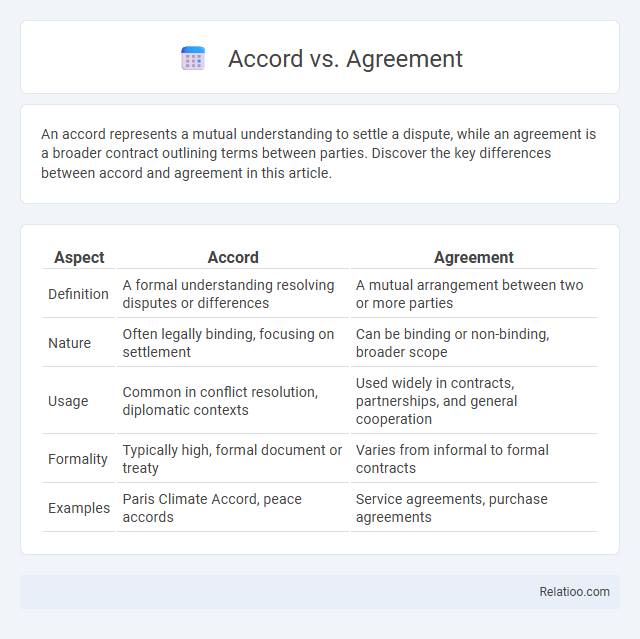An accord represents a mutual understanding to settle a dispute, while an agreement is a broader contract outlining terms between parties. Discover the key differences between accord and agreement in this article.
Table of Comparison
| Aspect | Accord | Agreement |
|---|---|---|
| Definition | A formal understanding resolving disputes or differences | A mutual arrangement between two or more parties |
| Nature | Often legally binding, focusing on settlement | Can be binding or non-binding, broader scope |
| Usage | Common in conflict resolution, diplomatic contexts | Used widely in contracts, partnerships, and general cooperation |
| Formality | Typically high, formal document or treaty | Varies from informal to formal contracts |
| Examples | Paris Climate Accord, peace accords | Service agreements, purchase agreements |
Defining Accord and Agreement
An accord is a legal contract where parties agree to accept different performance than originally obligated, effectively modifying the original agreement. An agreement is a mutual understanding between two or more parties about their rights and obligations, forming the basis of a contract. While an agreement establishes the initial terms, an accord creates a new contract resolving or altering prior obligations.
Key Differences Between Accord and Agreement
An accord is a specific type of agreement where parties agree to accept different terms than those originally agreed upon to settle a dispute, while an agreement is a broader term encompassing any mutual understanding between parties. The key difference lies in the purpose: an accord resolves a disagreement through a new contract, whereas an agreement can be any contract or arrangement between parties. In legal contexts, an accord usually requires a subsequent satisfaction or performance to discharge the original obligation, distinguishing it from a simple agreement that may not involve dispute resolution.
Legal Implications of Accord vs Agreement
An accord involves an agreement between parties to accept different performance from what was originally owed, effectively modifying the original contract and potentially discharging the original obligation upon satisfaction. An agreement is a broader legal term that encompasses any mutual understanding between parties, which may or may not have enforceable contractual obligations. The legal implications of an accord include the suspension or discharge of the original contract once the accord is executed, while a standard agreement creates binding obligations that each party must fulfill as originally stipulated.
Common Uses in Contracts
Accord refers to a contract where parties agree to accept different performance than originally promised, often resolving disputes or modifying obligations. Agreement is a broad term encompassing any mutual understanding between parties, including informal and formal contracts that outline rights and duties. In contracts, agreements signify the foundational consensus, while accords specifically address adjustments or settlements within existing contractual relationships.
Accord vs Agreement: Examples in Practice
An accord is a contractual arrangement where parties agree to satisfy a disputed obligation through a new agreement, often resolving conflicts without litigation. An example in practice is when a creditor accepts reduced payment under an accord, effectively settling the original debt. In contrast, an agreement is a broader term encompassing any mutual understanding or contract, such as lease agreements or service contracts, without necessarily involving dispute resolution.
Benefits and Drawbacks of Accord
An accord differs from a traditional agreement by resolving disputes through a settlement that modifies existing obligations, offering the benefit of flexibility and finality without litigation. The primary drawback of an accord is its reliance on strict compliance with the new terms; failure to perform allows the original contract to be enforced. Unlike standard agreements, accords provide a tailored solution for conflict resolution but may introduce complexity in enforcement and potential uncertainty if terms are not clearly defined.
Advantages and Limitations of Agreement
An agreement provides a clear, legally enforceable framework that outlines the obligations and rights of the parties involved, offering protection and predictability for your transactions. Its advantages include formal recognition and the ability to seek legal remedies if terms are breached, ensuring accountability and reducing disputes. However, agreements can be rigid, sometimes limiting flexibility and requiring time-consuming negotiation and precise language to avoid ambiguity or unintended consequences.
Choosing Between Accord and Agreement
Choosing between an accord and an agreement depends on the legal context and the intended outcome; an accord refers specifically to a settlement where parties agree to accept different terms than originally contracted, often to resolve a dispute. In contrast, an agreement is a broad term encompassing any mutual understanding or contract between parties, establishing rights and obligations. You should select an accord when modifying existing contractual obligations to avoid litigation, while an agreement is suitable for establishing new legal commitments.
Accord and Agreement in Dispute Resolution
An Accord in dispute resolution refers to a new agreement that modifies or settles the obligations of parties under a previous contract, effectively replacing the original terms. An Agreement denotes the initial contract or understanding that outlines the rights and duties of the parties involved. Understanding the distinction helps Your negotiation strategy, as an Accord resolves disputes by altering existing agreements, whereas an Agreement establishes the foundational legal commitments.
Frequently Asked Questions: Accord vs Agreement
An accord is a legal contract that resolves a dispute by agreeing to perform different obligations than originally contracted, while an agreement is a broader term referring to any mutual understanding or contract between parties. Frequently asked questions about accord vs agreement often involve their enforceability, with accords requiring satisfaction of new terms before the original obligation is considered discharged. Courts typically enforce accords only when the new terms are clearly defined and both parties consent, distinguishing them from general agreements which may or may not involve dispute resolution.

Infographic: Accord vs Agreement
 relatioo.com
relatioo.com